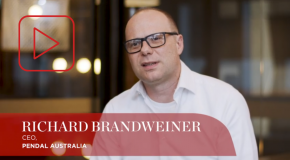State of play: Fintech in Nigeria
About this research
State of play: Fintech in Nigeria is an Economist Intelligence Unit report, sponsored by Mastercard and MTN Group. The report examines key trends in the fintech sector in Nigeria and assesses both industry drivers and impediments to further growth.
Related content

The shifting landscape of global wealth: Future-proofing prosperity in a ti...
In some instances the impact of this shift will be shaped by local factors, such as demographic changes. In other instances this shift will reflect shared characteristics, as demonstrated by the greater popularity of overseas investing among younger high-net-worth individuals (HNWIs) brought up in an era of globalisation. Whatever the drivers, the landscape of wealth is changing—from local to global, and from one focused on returns to one founded on personal values.
Despite rising economic concerns and a tradition of investor home bias in large parts of the world, the new landscape of wealth appears less interested in borders. According to a survey commissioned by RBC Wealth Management and conducted by The Economist Intelligence Unit (EIU), younger HNWIs are substantially more enthusiastic about foreign investing. The U.S. is a particularly high-profile example of a country where a long-standing preference for investments in local markets appears set to be transformed.
Click the thumbnail below to download the global executive summary.
Read additional articles from The EIU with detail on the shifting landscape of global wealth in Asia, Canada, the U.S. and UK on RBC's website.

Fintech in ASEAN
To better understand the opportunities and challenges in developing a fintech business in seven ASEAN markets, The Economist Intelligence Unit conducted wide-ranging desk research supplemented by seven in-depth interviews with executives in Australia and ASEAN.
Download report and watch video interview to learn more.

Risks and opportunities in a changing world
Read our Taxing digital services, U.S. tax reform: The global dimension, & Planning for life after NAFTA articles by clicking the thumbnails below.
Financing sustainability: Asia Pacific embraces the ESG challenge
Financing sustainability: Asia Pacific embraces the ESG challenge is an Economist Intelligence Unit report, sponsored by Westpac. It explores the drivers of sustainable finance growth in Asia Pacific as well as the factors constraining it. The analysis is based on two parallel surveys—one of investors and one of issuers—conducted in September and October 2019.
Related content

Financing sustainability | Insights video
What is driving the strong demand for financing sustainability in Asia Pacific? How can companies increase supply and start to see the benefits of sustainable finance in the next three years? We interviewed Richard Brandweiner, CEO of Pendal Australia, and Sophia Cheng, CIO of Cathay Financial Holdings and chair of Asia Investor Group on Climate Change, to find out.
To learn more: Download report | View infographic
Financing sustainability | Infographic
Financing sustainability: How do investors and issuers in APAC's sustainable finance market view the present market opportunities and constraints?
To learn more:
Download report | Watch video
Infrastructure | How will covid-19 reshape key Australian industries?
Critically, when the pandemic broke out, construction was declared an ‘essential service’ by the federal government. Work was permitted to continue, with social distancing measures applied. This came as a relief to many in the infrastructure and construction sectors, as site workers cannot work remotely, and many construction projects were being halted globally. New Zealand and Singapore, for example, took a stricter view of ‘non-essential’ projects, allowing only those that supported critical infrastructure or related to immediate health or life safety risks to continue.
The federal government elected not to issue a shut-down order in recognition of construction and infrastructure’s critical contribution to Australia’s economy. Construction is the nation’s third largest industry and accounted for 8% of Australia’s gross value added in 2018-19 for a value of A$32.9bn (US$23bn) in the first quarter of 2020.2 It also employs 9% of working age Australians.3
Of all the types of infrastructure, however, none has been more profoundly affected by covid-19 than airports. In this interview, Lyell Strambi, the chief executive officer of Melbourne Airport, explains how it has upended the most fundamental economic aspects of airport operations, as well as the broader impacts on Australia’s transport infrastructure. He also outlines why the inherent agility of the aviation sector makes it uniquely positioned to respond to even the most overwhelming of challenges.
1 Record infrastructure spend the new normal, 2019 Australian Infrastructure Audit warns, Infrastructure Australia, The Australian Government, 13th August 2019 2 Australian System of National Accounts 2018-2019, Australian Bureau of Statistics 3 Australian Government Labour Market Information PortalCan disruptive technologies bolster the competitiveness of North American Banks?
- Even more respondents in North America are convinced than those in other regions (90%, compared with 63% globally) that technology will be the trend to have the biggest impact on banks in their country in the next five years.
- Product agility and enabling embedded finance are bigger strategic priorities for North American banks than those in other regions in the next five years. Accordingly, they are investing more on agile technology delivery (DevOps) and blockchain technology.
More from this series
18196
Related content

The shifting landscape of global wealth: Future-proofing prosperity in a ti...
In some instances the impact of this shift will be shaped by local factors, such as demographic changes. In other instances this shift will reflect shared characteristics, as demonstrated by the greater popularity of overseas investing among younger high-net-worth individuals (HNWIs) brought up in an era of globalisation. Whatever the drivers, the landscape of wealth is changing—from local to global, and from one focused on returns to one founded on personal values.
Despite rising economic concerns and a tradition of investor home bias in large parts of the world, the new landscape of wealth appears less interested in borders. According to a survey commissioned by RBC Wealth Management and conducted by The Economist Intelligence Unit (EIU), younger HNWIs are substantially more enthusiastic about foreign investing. The U.S. is a particularly high-profile example of a country where a long-standing preference for investments in local markets appears set to be transformed.
Click the thumbnail below to download the global executive summary.
Read additional articles from The EIU with detail on the shifting landscape of global wealth in Asia, Canada, the U.S. and UK on RBC's website.

Fintech in ASEAN
To better understand the opportunities and challenges in developing a fintech business in seven ASEAN markets, The Economist Intelligence Unit conducted wide-ranging desk research supplemented by seven in-depth interviews with executives in Australia and ASEAN.
Download report and watch video interview to learn more.

Risks and opportunities in a changing world
Read our Taxing digital services, U.S. tax reform: The global dimension, & Planning for life after NAFTA articles by clicking the thumbnails below.
Podcast | Unlocking entrepreneurship in Asia-Pacific
Related content

Podcast | How to weather the coming recession
The late 2022 predictions of an impending global recession have not materialised, but the global economy is not out of the woods yet. In the fourth episode of the series "Shelter from the storm: Investing in the era of uncertainty," sponsored by EquitiesFirst, we look at the risk of persistent high inflation and global economic slowdown for Asia-Pacific economies. We also discuss how investors are adjusting their portfolios in response to the new reality of high interest rates.
Our guests are:
Charlie Buxton, head of investment management at The Fry Group Dhruv Arora, founder and CEO of SyfeShelter from the storm: Investing in the era of uncertainty is a five-part podcast series, supported by EquitiesFirst.
The episode is hosted by Piotr Zembrowski, CFA, Senior Manager, Policy and Insights at Economist Impact, and produced by Bilge Arslan and Rudi Osman.
*/The podcast has been prepared for informational purposes only. This episode is not an offering of a financial product or investment advice. It is not intended for residents in any jurisdiction where its use is not authorised or is unlawful.
Follow on Apple podcasts | Spotify | Google podcasts | Your preferred podcasting platforms

Podcast | Protecting investment portfolios against climate change risks
The episode is hosted by Piotr Zembrowski, CFA, Senior Manager, Policy and Insights at Economist Impact, and Bilge Arslan, Analyst, Policy and Insights at Economist Impact.
*/The podcast has been prepared for informational purposes only. This episode is not an offering of a financial product or investment advice. It is not intended for residents in any jurisdiction where its use is not authorised or is unlawful.
Follow on Apple podcasts | Spotify | Google podcasts | Your preferred podcasting platforms

Podcast | Can China's economic slowdown create opportunities in Asia?
This is the second episode in the "Shelter from the storm" series on economic, geopolitical and environmental challenges facing companies and markets today. In this episode, we look at the dominant role of China in Asia's economy and the effect its slowdown might have on the region.
Our guests are:
Raymond Cheng, managing director and chief investment officer for North Asia at Standard Chartered Bank in Hong Kong Martin Hennecke, head of Asia investment advisory at St. James Place Wealth ManagementShelter from the storm: Investing in the era of uncertainty is a five-part podcast series, supported by EquitiesFirst.
The episode is hosted by Piotr Zembrowski, CFA, Senior Manager, Policy and Insights at Economist Impact.
*/The podcast has been prepared for informational purposes only. This episode is not an offering of a financial product or investment advice. It is not intended for residents in any jurisdiction where its use is not authorised or is unlawful.
Follow on Apple podcasts | Spotify | Google podcasts | Your preferred podcasting platforms
Can banks create a true ecosystem with embedded finance?
- New technologies will have the biggest impact on banks in the next five years—more than changing customer demand and evolving regulation. Generative artificial intelligence (AI) in particular is expected to impact banking, according to 75% of respondents to a survey conducted by Economist Impact. More than 70% of survey respondents see unlocking value from AI as a key differentiator between winners and losers.
- Collaboration with fintechs or other technology providers is key to access expertise in emerging technologies as openbanking initiatives multiply across the world.
18178
Related content

The shifting landscape of global wealth: Future-proofing prosperity in a ti...
In some instances the impact of this shift will be shaped by local factors, such as demographic changes. In other instances this shift will reflect shared characteristics, as demonstrated by the greater popularity of overseas investing among younger high-net-worth individuals (HNWIs) brought up in an era of globalisation. Whatever the drivers, the landscape of wealth is changing—from local to global, and from one focused on returns to one founded on personal values.
Despite rising economic concerns and a tradition of investor home bias in large parts of the world, the new landscape of wealth appears less interested in borders. According to a survey commissioned by RBC Wealth Management and conducted by The Economist Intelligence Unit (EIU), younger HNWIs are substantially more enthusiastic about foreign investing. The U.S. is a particularly high-profile example of a country where a long-standing preference for investments in local markets appears set to be transformed.
Click the thumbnail below to download the global executive summary.
Read additional articles from The EIU with detail on the shifting landscape of global wealth in Asia, Canada, the U.S. and UK on RBC's website.

Fintech in ASEAN
To better understand the opportunities and challenges in developing a fintech business in seven ASEAN markets, The Economist Intelligence Unit conducted wide-ranging desk research supplemented by seven in-depth interviews with executives in Australia and ASEAN.
Download report and watch video interview to learn more.

Risks and opportunities in a changing world
Read our Taxing digital services, U.S. tax reform: The global dimension, & Planning for life after NAFTA articles by clicking the thumbnails below.
Podcast | India’s time to shine? Opportunity and risk in India
Related content

Podcast | Protecting investment portfolios against climate change risks
The episode is hosted by Piotr Zembrowski, CFA, Senior Manager, Policy and Insights at Economist Impact, and Bilge Arslan, Analyst, Policy and Insights at Economist Impact.
*/The podcast has been prepared for informational purposes only. This episode is not an offering of a financial product or investment advice. It is not intended for residents in any jurisdiction where its use is not authorised or is unlawful.
Follow on Apple podcasts | Spotify | Google podcasts | Your preferred podcasting platforms

Podcast | Can China's economic slowdown create opportunities in Asia?
This is the second episode in the "Shelter from the storm" series on economic, geopolitical and environmental challenges facing companies and markets today. In this episode, we look at the dominant role of China in Asia's economy and the effect its slowdown might have on the region.
Our guests are:
Raymond Cheng, managing director and chief investment officer for North Asia at Standard Chartered Bank in Hong Kong Martin Hennecke, head of Asia investment advisory at St. James Place Wealth ManagementShelter from the storm: Investing in the era of uncertainty is a five-part podcast series, supported by EquitiesFirst.
The episode is hosted by Piotr Zembrowski, CFA, Senior Manager, Policy and Insights at Economist Impact.
*/The podcast has been prepared for informational purposes only. This episode is not an offering of a financial product or investment advice. It is not intended for residents in any jurisdiction where its use is not authorised or is unlawful.
Follow on Apple podcasts | Spotify | Google podcasts | Your preferred podcasting platforms

Podcast | Shelter from the storm: Investing in the era of uncertainty
In the first episode in the "Shelter from the storm" series on economic, geopolitical and environmental challenges facing companies and markets today, our guests discuss the realignment of global supply chains and its effect on the economies and industries in Asia Pacific. They talk about ways in which investors can safeguard their portfolios and where they can find opportunities amid the turmoil.
The guests are:
Noli de Pala, CFA, Chief Investment Officer and Executive Director at TriLake Partners, Singapore Gareth Nicholson, Chief Investment Officer and Head of Discretionary Portfolio Management at Nomura International Wealth Management, Singapore.Shelter from the storm: Investing in the era of uncertainty is a five-episode series, sponsored by EquitiesFirst.
*/
The podcast has been prepared for informational purposes only. This episode is not an offering of a financial product or investment advice. It is not intended for residents in any jurisdiction where its use is not authorised or is unlawful.
Follow on Apple podcasts | Spotify | Google podcasts | Your preferred podcasting platforms
Fintech’s new wave: Exploring the impact of recession on the path towards digitalisation
We found that the pandemic accelerated the digitalisation of customer interaction by an average of three years and banks’ share of digital offerings by seven years. [1] However, at the time, we were also beginning to see the effects of digital transformation fatigue and explored the strategies that the world’s biggest banks were deploying to become more agile and customer-centric. Now, a year later, the landscape facing banks has changed dramatically. The covid19 digitalisation boom has come to an end, and the industry is preparing for a global recession.
18167
Related content

The shifting landscape of global wealth: Future-proofing prosperity in a ti...
In some instances the impact of this shift will be shaped by local factors, such as demographic changes. In other instances this shift will reflect shared characteristics, as demonstrated by the greater popularity of overseas investing among younger high-net-worth individuals (HNWIs) brought up in an era of globalisation. Whatever the drivers, the landscape of wealth is changing—from local to global, and from one focused on returns to one founded on personal values.
Despite rising economic concerns and a tradition of investor home bias in large parts of the world, the new landscape of wealth appears less interested in borders. According to a survey commissioned by RBC Wealth Management and conducted by The Economist Intelligence Unit (EIU), younger HNWIs are substantially more enthusiastic about foreign investing. The U.S. is a particularly high-profile example of a country where a long-standing preference for investments in local markets appears set to be transformed.
Click the thumbnail below to download the global executive summary.
Read additional articles from The EIU with detail on the shifting landscape of global wealth in Asia, Canada, the U.S. and UK on RBC's website.

Fintech in ASEAN
To better understand the opportunities and challenges in developing a fintech business in seven ASEAN markets, The Economist Intelligence Unit conducted wide-ranging desk research supplemented by seven in-depth interviews with executives in Australia and ASEAN.
Download report and watch video interview to learn more.

Risks and opportunities in a changing world
Read our Taxing digital services, U.S. tax reform: The global dimension, & Planning for life after NAFTA articles by clicking the thumbnails below.
Podcast | Protecting investment portfolios against climate change risks
Related content

The shifting landscape of global wealth: Future-proofing prosperity in a ti...
In some instances the impact of this shift will be shaped by local factors, such as demographic changes. In other instances this shift will reflect shared characteristics, as demonstrated by the greater popularity of overseas investing among younger high-net-worth individuals (HNWIs) brought up in an era of globalisation. Whatever the drivers, the landscape of wealth is changing—from local to global, and from one focused on returns to one founded on personal values.
Despite rising economic concerns and a tradition of investor home bias in large parts of the world, the new landscape of wealth appears less interested in borders. According to a survey commissioned by RBC Wealth Management and conducted by The Economist Intelligence Unit (EIU), younger HNWIs are substantially more enthusiastic about foreign investing. The U.S. is a particularly high-profile example of a country where a long-standing preference for investments in local markets appears set to be transformed.
Click the thumbnail below to download the global executive summary.
Read additional articles from The EIU with detail on the shifting landscape of global wealth in Asia, Canada, the U.S. and UK on RBC's website.

Fintech in ASEAN
To better understand the opportunities and challenges in developing a fintech business in seven ASEAN markets, The Economist Intelligence Unit conducted wide-ranging desk research supplemented by seven in-depth interviews with executives in Australia and ASEAN.
Download report and watch video interview to learn more.

Risks and opportunities in a changing world
Read our Taxing digital services, U.S. tax reform: The global dimension, & Planning for life after NAFTA articles by clicking the thumbnails below.
Podcast | Can China's economic slowdown create opportunities in Asia?
Related content

The shifting landscape of global wealth: Future-proofing prosperity in a ti...
In some instances the impact of this shift will be shaped by local factors, such as demographic changes. In other instances this shift will reflect shared characteristics, as demonstrated by the greater popularity of overseas investing among younger high-net-worth individuals (HNWIs) brought up in an era of globalisation. Whatever the drivers, the landscape of wealth is changing—from local to global, and from one focused on returns to one founded on personal values.
Despite rising economic concerns and a tradition of investor home bias in large parts of the world, the new landscape of wealth appears less interested in borders. According to a survey commissioned by RBC Wealth Management and conducted by The Economist Intelligence Unit (EIU), younger HNWIs are substantially more enthusiastic about foreign investing. The U.S. is a particularly high-profile example of a country where a long-standing preference for investments in local markets appears set to be transformed.
Click the thumbnail below to download the global executive summary.
Read additional articles from The EIU with detail on the shifting landscape of global wealth in Asia, Canada, the U.S. and UK on RBC's website.

Fintech in ASEAN
To better understand the opportunities and challenges in developing a fintech business in seven ASEAN markets, The Economist Intelligence Unit conducted wide-ranging desk research supplemented by seven in-depth interviews with executives in Australia and ASEAN.
Download report and watch video interview to learn more.

Risks and opportunities in a changing world
Read our Taxing digital services, U.S. tax reform: The global dimension, & Planning for life after NAFTA articles by clicking the thumbnails below.
Decarbonising Asia: Asset owners reach for net zero
- Kerry Adams-Strump, director of group ESG, Prudential
Related content

The shifting landscape of global wealth: Future-proofing prosperity in a ti...
In some instances the impact of this shift will be shaped by local factors, such as demographic changes. In other instances this shift will reflect shared characteristics, as demonstrated by the greater popularity of overseas investing among younger high-net-worth individuals (HNWIs) brought up in an era of globalisation. Whatever the drivers, the landscape of wealth is changing—from local to global, and from one focused on returns to one founded on personal values.
Despite rising economic concerns and a tradition of investor home bias in large parts of the world, the new landscape of wealth appears less interested in borders. According to a survey commissioned by RBC Wealth Management and conducted by The Economist Intelligence Unit (EIU), younger HNWIs are substantially more enthusiastic about foreign investing. The U.S. is a particularly high-profile example of a country where a long-standing preference for investments in local markets appears set to be transformed.
Click the thumbnail below to download the global executive summary.
Read additional articles from The EIU with detail on the shifting landscape of global wealth in Asia, Canada, the U.S. and UK on RBC's website.

Fintech in ASEAN
To better understand the opportunities and challenges in developing a fintech business in seven ASEAN markets, The Economist Intelligence Unit conducted wide-ranging desk research supplemented by seven in-depth interviews with executives in Australia and ASEAN.
Download report and watch video interview to learn more.

Risks and opportunities in a changing world
Read our Taxing digital services, U.S. tax reform: The global dimension, & Planning for life after NAFTA articles by clicking the thumbnails below.

